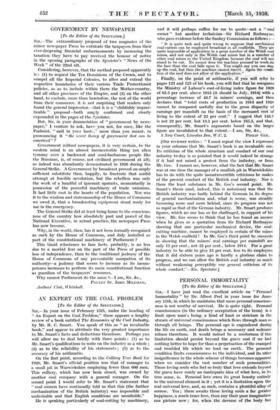AN EXPERT ON THE COAL PROBLEM
[To the Editor of the SPECTATOR.]
SIR,—In your issue of February 15th, under the heading of " An Expert on the Coal Problem," there appears a lengthy review of a book entitled The Economics of the Coal Industry, by Mr. R. C. Smart. You speak of this as " an invaluable book," and appear to attribute the very greatest importance to Mr. Smart's facts and deductions therefrom. Perhaps you will allow me to deal briefly with three points : (1) as to Mr. Smart's qualifications to write on the industry as a whole ; (2) as to the, reliability of his statements ; (3) as to the accuracy of his arithmetic.
On the first point, according to the Colliery Year Book for 1929, Mr. Smart's official position was that of manager to a small pit in Warwickshire employing fewer than 600 men. This colliery, which has now been closed, was owned by another coal company with a general manager. On the second point I would refer to Mr. Smart's statement that " coal owners have continually told in that this (the further mechanization of the British industry) was impossible and undesirable and that English conditions are unsuitable."
He is speaking particularly of coal-cutting by machinery, and it will perhaps suffice for me to- quote—not a " coal owner " but another technician—Sir Richard Redmayne, who gave evidence before the Sankey Commission as follows :—
" It is quite rash and quite wrong to suppose that mechanical coal-nutters can be employed broadcast in all coalfields. They arc quite impossible of application in a great number of the Welsh coal Mines, and not only in the Welsh coal mines but in a number of other coal mines in the United Kingdom because the coal will not stand to be cut: No sooner does the machine proceed, to work,,On the face than the coal falls upon it. You.might.say you can stay up the coak but then the machine cannot travel.. Again the coasli. tion of the roof does not allow of the applcatiOn."
, Finally, on the point of arithmetic, if you will refer to pages 123 and 125 of his book, you.will find that he conipares the Ministry of Labour's cost-of-living index figure for 1928 of 65.5 per cent. above 1913 (itshould be July, 1914) with a .
percentage increase of 43.7 in miners' earnings, and then
declares that " total costs of production in 1913 and 1928 cannot be compared usefully due to the gross disparity of earnings per manshift on the basis of the increased cost-Of living to the extent of 22 per cent." I suggest that 148.7
is not 22 per cent. but 13.1 per cent. below 165.5, and that, consequently, Mr. Smart's arguments based on the larger figure are invalidated to that extent.—I am, Sir, &c., 5 New Court, Lincolns Inn, 1V.C. 2. PHILIP GEE.
[Our reviewer writes : " I must repeat the view I expressed in your columns that Mr. Smart's book is an invaluable one. Its criticism of the whole structure and conduct of .our coal industry to-day is so pointed that it would indeed be strange if it had not raised a protest from the industry, or from Mr. Gee. I cannot see, however, what the fact that Mr. Smart
was at one time the manager of a smallish pit in Warwickshire has to do with the quite incontrovertible criticisms -he makes of the present conduct of the British coal industry., Nor is -there the least substance in Mr. Gee's second point. Mr. Smart's thesis (and, indeed, this is notorious) was that the British industry was badly behind the German in its degree of general mechanization- and, what is worse, was steadily becoming more and more behind, since its progreSs was not as rapid as that of the German industry.. Mr. Smartproduces
figures, which no one has so far .challenged, in support of liis view. Mr. Gee seems to .think that he has found an answer when he gives us a quotation from Sir Richard Redrniyne showing that one particular mechanical device,. the coal- cutting machine, cannot be employed in certain of the mines
in the Welsh coalfield 1 In Mr. Gee's third point he succeeds in showing that the miners' real earnings per manshift :are only 13 per cent., not 22 per cent., below. 1014. For a great industry to be able to give 13 per cent. less to its employees that it did sixteen years :ago is hardly a glortous claim to
progress, and we can allow the British coal industry` so much without weakening perceptibly our general criticismi of its whole conduct."—En. Spectator.]




















































 Previous page
Previous page